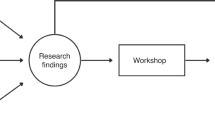Abstract
Purpose
There is an increasing effort in the global public health community to strengthen research capacity in low- and middle-income countries, but there is no consensus on how best to approach such endeavors. Successful consortia that perform research on HIV/AIDS and other infectious diseases exist, but few papers have been published detailing the challenges faced and lessons learned in setting up and running a successful research consortium.
Methods
Members of the African Research Group for Oncology (ARGO) participated in generating lessons learned regarding the foundation and maintenance of a cancer research consortium in Nigeria.
Results
Drawing on our experience of founding ARGO, we describe steps and key factors needed to establish a successful collaborative consortium between researchers from both high- and low-income countries. In addition, we present challenges we encountered in building our consortium, and how we managed those challenges. Although our research group is focused primarily on cancer, many of our lessons learned can be applied more widely in biomedical or public health research in low-income countries.
Conclusions
As the need for cancer care in LMICs continues to grow, the ability to create sustainable, innovative, collaborative research groups will become vital. Assessing the successes and failures that occur in creating and sustaining research consortia in LMICs is important for expansion of research and training capacity in LMICs.
Similar content being viewed by others
References
Bridge J, Hunter BM, Albers E, et al. The Global Fund to Fight AIDS, Tuberculosis and Malaria’s investments in harm reduction through the rounds-based funding model (2002–2014). Int J Drug Policy. 2016;27:132–7.
Nguku P, Mosha F, Prentice E, Galgalo T, Olayinka A, Nsubuga P. Field epidemiology and laboratory training programs have been in Africa for 10 years: what is their effect on laboratory-based surveillance? Reflections from a panel at the African Society of Laboratory Medicine December 2014 Cape Town meeting. Pan Afr Med J. 2015;20:451.
Ogundahunsi OA, Vahedi M, Kamau EM, et al. Strengthening research capacity: TDR’s evolving experience in low- and middle-income countries. PLoS Negl Trop Dis. 2015;9:e3380.
ESSENCE on Health Research. Seven principles for strengthening research capacity in low- and middle-income countries: simple ideas in a complex world. Geneva: World Health Organization; 2014.
Whitworth JA, Kokwaro G, Kinyanjui S, et al. Strengthening capacity for health research in Africa. Lancet. 2008;372:1590–3.
Marjanovic S, Hanlin R, Diepeveen S, Chataway J. Research capacity-building in Africa: networks, institutions, and local ownership. J Int Dev. 2013;25:936–46.
Breman JG, Bridbord K, Kupfer LE, Glass RI. Global health: the Fogarty International Center, National Institutes of Health: vision and mission, programs, and accomplishments. Infect Dis Clin N Am. 2011;25:511–36, vii.
Bates I, Taegtmeyer M, Squire SB, et al. Indicators of sustainable capacity building for health research: analysis of four African case studies. Health Res Policy Syst. 2011;9:14.
Einterz RM, Kimaiyo S, Mengech HN, et al. Responding to the HIV pandemic: the power of an academic medical partnership. Acad Med. 2007;82:812–8.
Ali R, Finlayson A, Indox Cancer Research Network. Building capacity for clinical research in developing countries: the INDOX Cancer Research Network experience. Glob Health Action. 2012;5.
Chu KM, Jayaraman S, Kyamanywa P, Ntakiyiruta G. Building research capacity in Africa: equity and global health collaborations. PLoS Med. 2014;11:e1001612.
Harris E. Building scientific capacity in developing countries. EMBO Rep. 2004;5:7–11.
Kingham TP, Alatise OI. Establishing translational and clinical cancer research collaborations between high- and low-income countries. Ann Surg Oncol. 2015;22:741–6.
Soreide K, Alderson D, Bergenfelz A, et al. Strategies to improve clinical research in surgery through international collaboration. Lancet. 2013;382:1140–51.
Vasquez EE, Hirsch JS, le Giang M, Parker RG. Rethinking health research capacity strengthening. Glob Public Health. 2013;8(Suppl 1):S104–24.
Bates I, Phillips R, Martin-Peprah R, et al. Assessing and strengthening African universities’ capacity for doctoral programmes. PLoS Med. 2011;8:e1001068.
Kabiru CW, Izugbara CO, Wairimu J, Amendah D, Ezeh AC. Strengthening local health research capacity in Africa: the African Doctoral Dissertation Research Fellowship Program. Pan Afr Med J. 2014;17(Suppl 1):1.
Nelson AM, Milner DA, Rebbeck TR, Iliyasu Y. Oncologic care and pathology resources in Africa: survey and recommendations. J Clin Oncol. 2016;34:20–6.
Harris PA, Taylor R, Thielke R, Payne J, Gonzalez N, Conde JG. Research electronic data capture (REDCap): a metadata-driven methodology and workflow process for providing translational research informatics support. J Biomed Inform. 2009;42:377–81.
van Helden P. The cost of research in developing countries. EMBO Rep. 2012;13:395.
Sullivan R, Alatise OI, Anderson BO, et al. Global cancer surgery: delivering safe, affordable, and timely cancer surgery. Lancet Oncol. 2015;16:1193–224.
Acknowledgments
This study was supported in part by the NCI’s Pilot Collaboration with LMICs in Global Cancer Research or Global Health Research at NCI-designated Cancer Centers, by the NIH/NCI Cancer Center Support Grant P30 CA008748, and by the Thompson Family Foundation. ARGO thanks Dr. Olawumi Yejide Olajide, Olawale Eyitayo Olalude, Paula Garcia, and Liana Langdon-Embry for their work as research coordinators.
Disclosure
None.
Author information
Authors and Affiliations
Corresponding author
Rights and permissions
About this article
Cite this article
Fischer, S.E., Alatise, O.I., Komolafe, A.O. et al. Establishing a Cancer Research Consortium in Low- and Middle-Income Countries: Challenges Faced and Lessons Learned. Ann Surg Oncol 24, 627–631 (2017). https://doi.org/10.1245/s10434-016-5624-2
Received:
Published:
Issue Date:
DOI: https://doi.org/10.1245/s10434-016-5624-2




